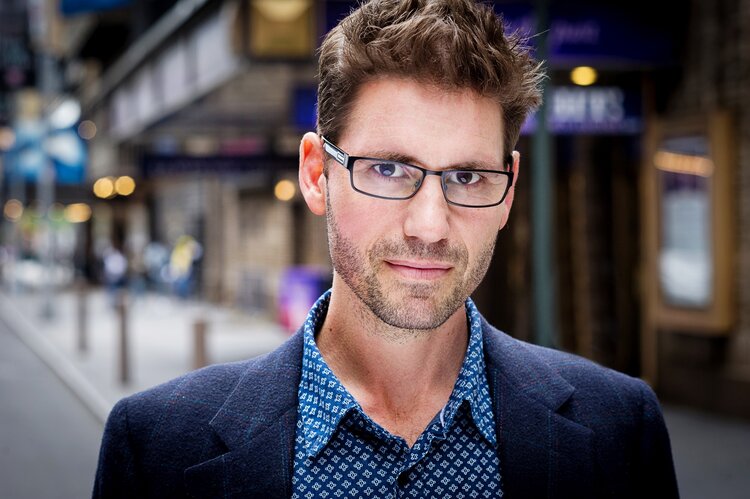About
I currently serve as Artistic Director and Associate Professor at the University of Kansas, and recently serve as Acting Artistic Director at Center REP, Interim Artistic Director at Theatre Aspen, and Founding Artistic Director of NewYorkRep.
My directing work includes the Off-Broadway production of Stalking the Bogeyman at New World Stages (Outer Critics Circle Award nomination, NYTimes Critics’ Pick), Church & State (Off-Broadway Alliance Award nominee), and Red Speedo at Center REP (recommended by Bay Area Critics). In London, my direction of Stalking the Bogeyman at Southwark Playhouse earned an Off West End Award nomination. Other selected productions include Lost Boy Found in Whole Foods by Tammy Ryan at Portland Stage, and Why You Beasting by David Don Miller (Time Out NY Critics’ Pick).
As an actor, I’ve performed at The Guthrie Theater, Long Wharf, Berkeley Rep, A.C.T., and Denver Center, and toured nationally with Death of a Salesman alongside Christopher Lloyd. As a producer, I was part of the team that transferred Eric Coble’s The Velocity of Autumn to Broadway, starring Estelle Parsons in a Tony-nominated performance.
I earned my MFA in Directing from Columbia University.
My Mission
Theatre can both disrupt and delight. I aim to direct and develop work that challenges systems of injustice while also making room for levity, beauty, and human connection. I’m drawn to projects that cultivate curiosity, ask difficult questions, and welcome audiences into a shared emotional and intellectual space.
I believe that the arts can—and must—be a catalyst for empathy, accountability, and imagination. As a theatre-maker, my work is rooted in this dual mission: to provoke reflection and to generate joy.
Equity & Inclusion
I grew up in a multiracial family in the Bay Area, on the ancestral lands of the Tachi Yokut. My father—a Montford Point Marine and civil rights activist—was one of the first Black homeowners in a segregated neighborhood in Concord, California. My mother, a first-generation white immigrant, raised us to understand both pride and precarity. My siblings are Black and Indigenous. My extended family spans multiple cultures and identities, including Japanese and Mexican. This is the backdrop that shaped me.
From an early age, I saw how access, advocacy, and action can shift the course of a life—and how systems of exclusion persist despite appearances of progress. My father's leadership was quiet but persistent, always rooted in community, compassion, and courage. His example informs every space I create and every team I lead.
I also carry the complexity of moving through the world with light skin in a family that endured explicit racism. I haven't always understood the privilege that came with that. I’ve made mistakes. I’ve missed cues. But I continue to commit myself to listening harder, speaking up when it matters, and showing up with accountability.
As an artistic leader and educator, I’m committed to dismantling barriers that have historically excluded BIPOC and global majority artists, students, and colleagues. I strive to build working and learning environments where equity isn’t just performative—it’s structural, measurable, and enduring. I believe in transparency, in shared power, and in the hard, unglamorous work of reflection and repair.
At KU, I serve as a Mellon DEI Teaching Scholar, collaborating with campus leaders, artists, and faculty to integrate the work of historically marginalized voices into the classroom and across disciplines. Our efforts include building inclusive curricular modules tied to live performance, reshaping evaluation practices, and crafting spaces where students feel seen, heard, and supported.
This work is not static. It evolves with every rehearsal room, every student, every conversation. I welcome challenge. I value discomfort as a pathway to growth. And I believe our field can—and must—be transformed through intentional, community-centered change.
The New York Times called Potter’s work “Breathtaking chilling and dynamic”, giving Stalking the Bogeyman the heralded critic’s pick. Rex Reed of the New York Observer described Potter’s direction as “Potent stuff that never soft soaps the issues and leaves you stunned. HIGHLY RECOMMENDED."
New York Theatre described Potter’s direction as “Impeccable in it’s stage craft & elaborately detailed.” The Huffington Post declared it as “Careful and cogent direction.” The Bergen Record called a production “An intense drama presented with an unfussy simplicity and clarity”, naming it the “10 best plays of the year.” Neil Genzlinger, of The New York Times described Potter’s production as “Compelling. till thinking about it 24 hours later.”
